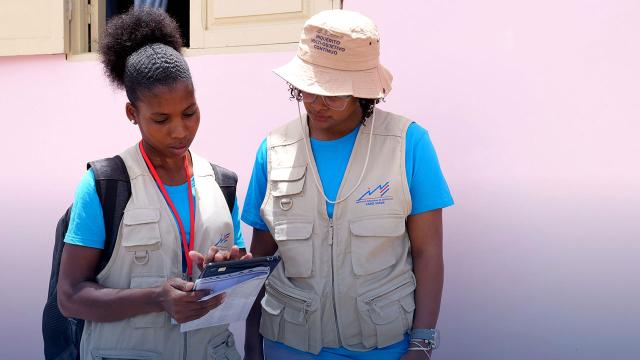Strengthening the Cabo Verde climate governance framework
In execution
© Inês DE SOUSA MOURÃO

Preview
Donor(s)
- United Nations
Implementation period
11.09.2025 - 10.03.2027
Total duration
18 months
Context
Cabo Verde, a small island country in the Atlantic Ocean, faces growing threats from climate change. Rising sea levels, prolonged droughts, and more frequent extreme weather events are putting pressure on people, ecosystems and vital sectors such as agriculture, water, health, and infrastructure. These impacts are felt most acutely by vulnerable communities, including women, children, and people living in remote areas.
Although the country has made important commitments to climate action, such as its updated Nationally Determined Contribution and its National Adaptation Plan, it struggles with limited resources, fragmented coordination, and gaps in technical capacity. These challenges make it difficult to translate plans into action and protect communities from climate risks.
This project strengthens Cabo Verde’s capacity to respond to climate change by improving how decisions are made, how institutions collaborate, and how citizens are involved in shaping climate solutions.
Objectives
Complementing the ongoing Climate Action Programme, the project aims to make climate governance in Cabo Verde more inclusive, effective, and coordinated. It supports the implementation of a national climate governance system that brings together government ministries, local authorities, civil society, businesses, and universities. The project develops the skills of public officials, civil society groups, and community representatives to plan, implement, and monitor climate action. It also helps to implement key tools such as a Strategic Plan to Mobilise Climate Support and guidelines for integrating climate action into key sectors. By equipping people and institutions with knowledge, leadership, and resources, the project enables Cabo Verde to become more resilient and take a leading role in regional and international climate efforts.
Beneficiaries
The project directly benefits national institutions, ministries, civil society organisations, youth, women, children, people with disabilities, academic institutions, and the private sector. It empowers these groups through training, climate education, and inclusive decision-making, strengthening their role in shaping and implementing climate solutions. Special attention is given to those who are often underrepresented in climate policy: women, men, and vulnerable groups will be actively included in decision-making processes, capacity-building, and benefit-sharing mechanisms.
Indirectly, all Cabo Verdeans benefit from improved resilience, enhanced public services, and more responsive climate governance.
Target geographical area
The project operates across the entire country, with a special focus on selected municipalities. These areas have been chosen for their vulnerability to climate impacts and their importance in local governance and development.
Stakeholders
The project is implemented by LuxDev, the Luxembourg Development Cooperation Agency, in partnership with Cabo Verde’s Ministry of Finance, the National Secretariat for Climate Action, and key ministries. It involves local authorities, civil society groups, youth and disability associations, universities, and businesses.
Strategic partners include the Embassy of Luxembourg, the Platform for Environmental and Conservation NGOs, the Chambers of Commerce, and international organisations such as the United Nations Industrial Development Organization and the Food and Agriculture Organization.
Budget
Total budget
EUR 682,970
Contribution breakdown
-
EUR 682,970
United Nations
Explore more
LuxDev implements other projects and programmes in the same country or sector.
All projects-

In execution Cabo Verde
Cabo Verde’s climate action planning at local level
Environment and climate change
Cabo Verde’s climate action planning at local level -
In execution Cabo Verde
Energy transition support programme
Environment and climate change
Energy transition support programme -

In execution Cabo Verde
Support for the production, analysis and dissemination of quality statistics in Cabo Verde
Governance
Support for the production, analysis and dissemination of quality statistics in Cabo Verde


